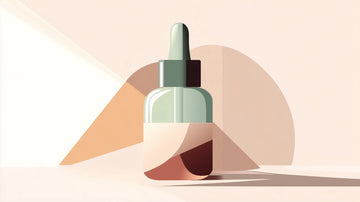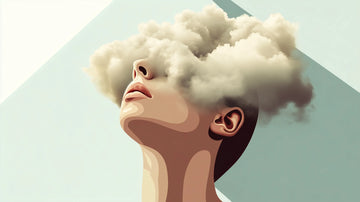If you are a woman over 40, you may be wondering if you will ever regain your libido.
Some of the women in our community with whom we interact say it’s the LAST thing on their to-do list! They are often too exhausted, or simply just not in the mood. Either that, or it’s too painful due to vaginal dryness.
Of course, sex is not mandatory as we age, and many women are happy no longer having to worry about it. But if you still want to have a good sex life, you might need to check whether it is your hormones that are to blame.
The hormones that affect your libido
Cortisol
Stress and sex? They really don't go together! Cortisol weakens your sex hormones, which pushes you to prefer the chocolate bar over your partner.
Cortisol and sex hormones are all produced from the same precursor hormone, pregnenolone. So guess what happens when you’re stressed? Pregnenolone is signaled to produce more cortisol instead of sex hormones (as we know, our stress response takes precedence over our reproductive function when survival is at stake).
Cortisol also increases another hormone, prolactin, which may prevent you from ovulating. Thus, your sex hormones are relegated to the background, your testosterone and libido vanish, and a worn-out appearance takes over from a vibrant one!
Thyroid
Thyroid hormones regulate the production of your sex hormones. If you do not have enough thyroid, your libido may decrease and your fertility may be affected. The thyroid also helps convert cholesterol into progesterone, which is essential for a healthy libido.
Estrogens
To feel attractive, you need a good level of estrogen (which often explains why you are in a good mood at the time of ovulation). If your estrogen level is low and you feel tired and irritable, that will be the last thing on your mind.
A low level of estrogen may also be responsible for vaginal dryness and night sweats, which will not help you feel attractive and desirable! And even if you manage to maintain your libido, orgasms may be more difficult to achieve and less intense.
However, it is crucial that there are not too many estrogens. Higher levels are common as one approaches perimenopause, contributing to premenstrual syndrome, bloating, weight gain, and low libido.
Progesterone
To balance estrogen, you need healthy levels of progesterone. It's your anti-stress hormone, and it helps to maintain your libido. But in the years leading up to menopause, ovulation becomes irregular and progesterone drops rapidly. And any stress in your life can worsen the situation, as the production of cortisol takes precedence over progesterone.
Testosterone
Traditionally regarded as a male hormone, testosterone is also essential for women. It contributes to sexual desire, but it is also vital for the health of the brain, bones, and heart. It can decline rapidly during perimenopause and beyond, so it is important to know how to naturally maintain healthy levels.
Other factors
Of course, these are only a few of the physical factors behind a decrease in libido. Your diet, nutrient absorption, and lifestyle can also have a significant impact. And of course, there are emotional factors to take into account, as well as the obvious physical attraction toward your partner.
But balancing your hormones, especially after 40, can change the game.
Our advice for improving your libido
Here are some natural methods to balance your hormones and stimulate your libido.
Relax
Reducing your level of stress can balance your cortisol and stimulate your energy, your mood, and the production of sex hormones. Try to practice daily mindful meditation (just 10 minutes can make a difference).
Ensure that your blood sugar is balanced.
If you eat a lot of carbohydrates and sugar, you risk having fluctuating blood sugar levels, which will drain your energy and affect your mood. Make sure to include proteins and fats in every meal, as well as low glycemic index carbohydrates that won’t cause blood sugar spikes.
Fat is your friend
Your sex hormones are produced from cholesterol, so it is important to consume plenty of healthy fats in your diet. Try avocados, nuts, seeds, coconut oil, olive oil, and fatty fish. A high-quality fish oil supplement may help you.
Consume cruciferous vegetables
Broccoli, cauliflower, cabbage, Swiss chard, kale, arugula - they all contain an important compound that helps regulate estrogen levels.
The baths with Epsom salt
The magnesium contained in Epsom salt will help to relax your muscles and relieve your stress. A perfect routine before bed to set the mood.
Take some maca
Known as 'nature's viagra' in Peru, maca is an ancient superfood with libido-stimulating properties!
Monitor your medications
The contraceptive pill is designed to suppress ovulation, and therefore the production of sex hormones, and the decrease in libido is a common side effect. Other medications often have similar side effects. Ask your doctor to re-evaluate them and discuss the alternatives you might try.
Try HIIT
It has been demonstrated that high-intensity interval training increases testosterone. It is also ideal for burning fat!
Do yoga
For strength, flexibility, mood, and stress reduction – all of this is good for your sex life!
Detoxify your environment
The chemicals contained in non-organic foods, plastics, cleaning products, and personal care products can mimic estrogens and disrupt your delicate hormonal balance. Adopt organic products and opt for more natural household product brands.
Dietary supplements
These supplements are particularly beneficial for restoring your libodo.
- Harmony from Laboratoires üma (do not take if you are undergoing hormone replacement therapy)
- NUTRALIE MACA High Dose 24000 mg
- Pharma Nord Omega 7 Sea Buckthorn Oil
Consult your doctor if you are undergoing treatment or if you are hesitant to take dietary supplements. Note that we do not recommend hormone replacement therapy due to the probable long-term risks about your health.
Are you getting tested?
If you are not satisfied with the situation, you are not obliged to accept it permanently!
As we have explained, decreased libido can be multifactorial. Tests can identify hormones that might be imbalanced and uncover other health issues (for example, stress, inflammation, digestive issues, nutrient deficiencies) that could be contributing to your symptoms.
Once you know what you're dealing with, you'll be able to set up a personalized plan to achieve faster results.
With love, the üma team.






